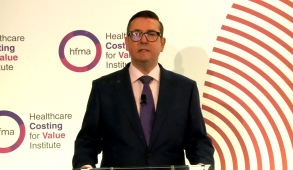More frequent cost collection put on hold
The national bodies responsible for costing and pricing unveiled plans for a further engagement exercise with the NHS costing community at a webinar at the end of May, organised by the HFMA Healthcare Costing for Value Institute.
Chris Walters, NHS England and NHS Improvement’s director of costing and pricing, said the proposal for a possible more frequent cost collection, in addition to the current annual national cost collection, was taken to the national bodies’ decision makers in May. ‘There was broad based support that there might be value in doing this,’ he said. ‘But the information we had so far on the relative costs and benefits was not sufficient for them to be comfortable that taking the decision was the right thing to do now,’ he said.
‘So, we’ve paused the process of taking that decision,’ he continued. ‘And what we intend to do is gather more information about the costs and benefits of whether, and if so how, we should collect costs more frequently.’ The May webinar was the first step in this extra engagement.
Ed Waller, deputy chief finance officer for strategic and financial planning at NHS England and NHS Improvement, said costing had a major role to play in supporting the NHS to meet the Treasury’s 2.2% efficiency target and in helping new decision makers in integrated care boards to make good comparative decisions about the care that should be delivered.
And he asked costing practitioners to give their views on how to build a costing system for the medium term that would support these aims.
Costing practitioners at the webinar called for a simplification of the costing guidance and standards and for the national cost collection to more closely resemble the way trusts collect and report costs locally. They believe the process should concentrate on material costs and there should be a focus on data that is ‘good enough’ for decision making.
Several pointed out that this had been the same message from the costing community for years and the HFMA had consistently called for simplification, for example in recommendations for change in 2019 and in last year’s What does good look like for costing in the NHS?
A briefing note published by NHS England and NHS Improvement ahead of the webinar said that a lot had already been done to reduce the burden of the national cost collection. But it said there was further to go in streamlining the guidance, shortening the process, increasing the flexibility and providing more support.
And having transitioned from reference costs to patient-level costs, there was now the flexibility to move the requirements of the national cost collection closer to the processes used locally for patient-level costing.
Mr Walters said the major area of difference between the national cost collection and local business-as-usual costing was the treatment of unbundled costs. ‘Unbundling’ is where components of a care pathway – such as chemotherapy, critical care or diagnostic imaging – are stripped out of the overall patient cost and calculated separately.
He said this had been an important requirement in informing accurate national prices. But with the move away from setting a mandatory national tariff, he suggested the centre could ‘afford to be much less prescriptive about what if any requirements we have for unbundling costs’.
There may still be a need to estimate unbundled costs for national purposes, but consideration was being given to whether this could be calculated centrally using raw data.
NHS England and NHS Improvement are working with technology partner Palantir to explore whether existing data-streams in providers can be extracted to produce a more frequent cost collection automatically. ‘Even though the work with Palantir is in the early days, we feel pretty confident that automating something that looks like old school aggregated reference costs returns is feasible,’ said Mr Walters. ‘How much more detail is possible to layer onto a fully automated process is an area for further investigation.’
However, one delegate pointed out that aggregate submissions did not necessarily mean less burden on costing teams as these aggregates were built up from patient-level costings.
NHS England and NHS Improvement’s briefing note said that it was ‘self-evident’ that the main benefits of collecting patient level costs more frequently were local. The key role for the centre was in ensuring consistency across local costing processes so that comparisons could be made across providers within systems and between systems. The centre could also help by clarifying information governance issues.
The speed of publishing national cost data was also highlighted. The 2020/21 national cost collection data has yet to be published on the NHS England website, although the data has recently been released via the PLICS portal. Helen Laing, deputy director of costing at NHS England and NHS Improvement said the centre was ‘acutely aware’ of the need for a rapid turn-around on submitted data.
‘Clinical data is available in real time and that is what we should be achieving for costing data as well,’ she said.
The webinar can be viewed on demand here
Related content
We are excited to bring you a fun packed Eastern Branch Conference in 2025 over three days.
This event is for those that will benefit from an overview of costing in the NHS or those new to costing and will cover why we cost and the processes.